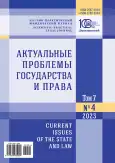Problems of identity formation in the era of globalization: philosophical and legal dimension
- Authors: SOLOVYOVA V.V.1, CHUNOSOV V.S.1
-
Affiliations:
- Lipetsk Branch of The Russian Presidential Academy of National Economy and Public Administration
- Issue: Vol 7, No 4 (2023)
- Pages: 544-550
- Section: General Theory and History of Law and the State
- URL: https://journal-vniispk.ru/2587-9340/article/view/303718
- ID: 303718
Cite item
Abstract
Globalization significantly influences the social, legal, cultural factors of the objective and subjective transformation of personality, creating new forms of articulation of politics and economics, formed on the interaction of capital and advanced information technologies. This global system, together with cyberspace, has a huge impact on the state structure of countries, the management system, law, culture, a person with his inherent identity, creating conditions for both homogenization and differentiation of identity. In the period of globalization, the processes of searching and protecting identity not only do not lose relevance, but on the contrary, they acquire incomparably greater importance for society and the individual. Modern realities confirm the opinion that it is impossible to live in the modern world while at the same time being aloof from the trends that determine both global and local levels of social development. In this context, the issue of defining the concept of identity and the legal mechanisms of its formation is becoming relevant. The study of identity through the prism of globalization is determined by the need to search for peaceful and fair, free coexistence of different people, socio-cultural spaces and lifestyles (styles). In the context of the development of the modern information society and global challenges, the phenomenon of “identity crisis” has formed, as a result of which an urgent need has arisen to solve the dilemma of real and unreal existence, to search for the inner, real “Me”. The problem of the search for identity prompts many modern scientists to return again and again to the philosophy of existentialism and rethink its influence on modern relations. In particular, the ways of finding one’s own identity proposed by existentialists, the ideas of freedom as an existential choice, as a set of possibilities remain relevant for modern science. Their deep content has not yet been fully revealed and studied and requires new awareness and interpretation to create a more holistic view and expand the spectrum of understanding of the existentialist worldview in the domestic philosophical and legal space.
About the authors
Victoria V. SOLOVYOVA
Lipetsk Branch of The Russian Presidential Academy of National Economy and Public Administration
Author for correspondence.
Email: viktoriya-solove@list.ru
ORCID iD: 0000-0002-3843-3675
Dr. habil. (History), Professor, Professor of Criminal Law, Procedure and Criminology Department
Russian Federation, 3 Internatsionalnaya St., Lipetsk, 398050, Russian FederationVladislav S. CHUNOSOV
Lipetsk Branch of The Russian Presidential Academy of National Economy and Public Administration
Email: vlad.chunosov@mail.ru
PhD (Law), Associate Professor of Civil Law and Procedure Department
Russian Federation, 3 Internatsionalnaya St., Lipetsk, 398050, Russian FederationReferences
- Lebon G. (1995). Psikhologiya narodov i mass [Psychology of Peoples and Masses]. Moscow, Maket Publ., 311 p. (In Russ.)
- Lapkin V.V. (2008). Modernization, globalization, identity. General problems and Russian particularities. POLIS. Politicheskie issledovaniya = POLIS. Political Studies, no. 3, pp. 50-58. (In Russ.) https://elibrary.ru/juqcvv
- Kozlovets N.A. (2008). Globalizatsiya: poisk novykh form identichnosti [Globalization: the search for new forms of identity]. Vestnik Buryatskogo gosudarstvennogo universiteta = Bulletin of Buryat State University, no. 6, pp. 49-55. (In Russ.) https://elibrary.ru/iulpob
- Vasil’ev A.A. (2017). Church and state in the conservative paradigm of Russia: symphony search. Aktual’nye problemy gosudarstva i prava = Current Issues of the State and Law, vol. 1, no. 3-4, pp. 5-25. (In Russ.) https://elibrary.ru/yohrks
- Khaidegger M. (1993). Vopros o tekhnike [Question about technology]. Vremya i bytie: stat’i i vystupleniya [Time and Being: Articles and Speeches]. Moscow, Respublika Publ., pp. 221-238. (In Russ.)
- Khorkkhaimer M., Adorno T. (1997). Dialektika Prosveshcheniya. Filosofskie fragment [Dialectics of Enlightenment. Philosophical Fragments]. Moscow, St. Petersburg, Medium, Yuventa Publ., 312 p. (In Russ.)
- Malkov N.G. (2023). Legal reality in the context of social reality: a philosophical-legal perspective. Aktual’nye problemy gosudarstva i prava = Current Issues of the State and Law, vol. 7, no. 1 (25), pp. 28-34. (In Russ.) https://doi.org/10.20310/2587-9340-2023-7-1-28-34, https://elibrary.ru/bswepm
- Vorob’eva S.V. (2017). The issue of strengthening of the sovereignty of Russian statehood. Aktual’nye problemy gosudarstva i prava = Current Issues of the State and Law, vol. 1, no. 3-4, pp. 48-57. (In Russ.) https://elibrary.ru/yohrmc
- Morozova L.A. (2018). Features of forms of realization of the rights and freedoms of the person. Aktual’nye problemy gosudarstva i prava = Current Issues of the State and Law, vol. 2, no. 5, pp. 5-17. (In Russ.) https://doi.org/10.20310/2587-9340-2018-2-5-5-17, https://elibrary.ru/xnburn
- Pronina K.Yu. (2017). Legal nihilism as an indicator of civil-law activity. Aktual’nye problemy gosudarstva i prava = Current Issues of the State and Law, vol. 1, no. 3-4, pp. 32-40. (In Russ.) https://elibrary.ru/yohrlk
Supplementary files








